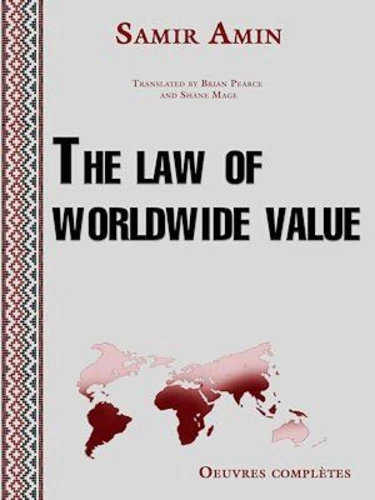The law of worldwide value
Par :Formats :
Disponible dans votre compte client Decitre ou Furet du Nord dès validation de votre commande. Le format ePub est :
- Compatible avec une lecture sur My Vivlio (smartphone, tablette, ordinateur)
- Compatible avec une lecture sur liseuses Vivlio
- Pour les liseuses autres que Vivlio, vous devez utiliser le logiciel Adobe Digital Edition. Non compatible avec la lecture sur les liseuses Kindle, Remarkable et Sony
 , qui est-ce ?
, qui est-ce ?Notre partenaire de plateforme de lecture numérique où vous retrouverez l'ensemble de vos ebooks gratuitement
Pour en savoir plus sur nos ebooks, consultez notre aide en ligne ici
- Nombre de pages235
- FormatePub
- ISBN978-2-37918-281-5
- EAN9782379182815
- Date de parution14/04/2020
- Protection num.Digital Watermarking
- Taille502 Ko
- Infos supplémentairesepub
- ÉditeurNENA
Résumé
Marx is not a philosopher, a historian, an economist, a political scientist, or a sociologist. He is not even a scholar of the first rank in any of those disciplines. Nor even a talented professor who prepared a good multidisciplinary dish cooked with all these ingredients. Marx's place is quite outside all that. Marx is the beginning of the radical critique of modern times, starting with the critique of the real world.
This radical critique of capitalism demands and allows discovery of the basis of market alienation and, inseparable from it, the exploitation of labor. The foundational status of the concept of value derives from this radical critique. It alone allows a grasp of the objective laws that govern the reproduction of the system, underlying those surface movements perceptible through direct observation of reality.
Marx links to this critique of the real world the critique of discourses about that reality : those of philosophy, economics, sociology, history, and political science. This radical critique uncovers their true nature which, in the last analysis, is always an apologetic one, legitimizing the practices of capital's dominating power.
This radical critique of capitalism demands and allows discovery of the basis of market alienation and, inseparable from it, the exploitation of labor. The foundational status of the concept of value derives from this radical critique. It alone allows a grasp of the objective laws that govern the reproduction of the system, underlying those surface movements perceptible through direct observation of reality.
Marx links to this critique of the real world the critique of discourses about that reality : those of philosophy, economics, sociology, history, and political science. This radical critique uncovers their true nature which, in the last analysis, is always an apologetic one, legitimizing the practices of capital's dominating power.
Marx is not a philosopher, a historian, an economist, a political scientist, or a sociologist. He is not even a scholar of the first rank in any of those disciplines. Nor even a talented professor who prepared a good multidisciplinary dish cooked with all these ingredients. Marx's place is quite outside all that. Marx is the beginning of the radical critique of modern times, starting with the critique of the real world.
This radical critique of capitalism demands and allows discovery of the basis of market alienation and, inseparable from it, the exploitation of labor. The foundational status of the concept of value derives from this radical critique. It alone allows a grasp of the objective laws that govern the reproduction of the system, underlying those surface movements perceptible through direct observation of reality.
Marx links to this critique of the real world the critique of discourses about that reality : those of philosophy, economics, sociology, history, and political science. This radical critique uncovers their true nature which, in the last analysis, is always an apologetic one, legitimizing the practices of capital's dominating power.
This radical critique of capitalism demands and allows discovery of the basis of market alienation and, inseparable from it, the exploitation of labor. The foundational status of the concept of value derives from this radical critique. It alone allows a grasp of the objective laws that govern the reproduction of the system, underlying those surface movements perceptible through direct observation of reality.
Marx links to this critique of the real world the critique of discourses about that reality : those of philosophy, economics, sociology, history, and political science. This radical critique uncovers their true nature which, in the last analysis, is always an apologetic one, legitimizing the practices of capital's dominating power.






















